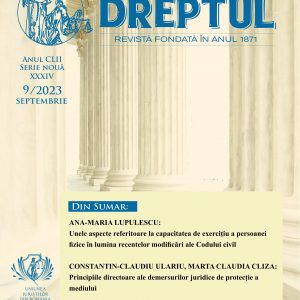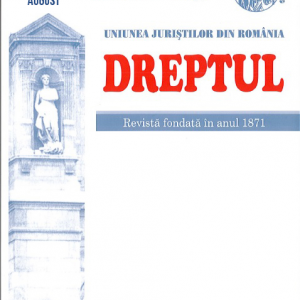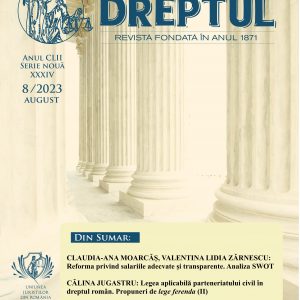-
 The attenuating circumstance of the challenge is provided by the Criminal Code in force in Article 75 (1) a). By the challenging act of illegitimate nature it is affected the physical integrity or dignity of the person, so that, although punished by the criminal law, the offender’s deed is merely a reaction, a disproportionate response to an illegitimate action or inaction. The challenge can only be retained if the conditions relating to the offence committed under the auspices of a powerful disorder or emotion, respectively the conditions relating to the challenging act are cumulatively met. Without claiming to exhaust the subject, the paper aims to emphasize also some controversies regarding: the proportionality and the time interval between the challenging act and the offence; the distinction between the challenge and some justificative causes or causes of non-imputability; the possibility of retaining the challenge concurrently with the premeditation.
The attenuating circumstance of the challenge is provided by the Criminal Code in force in Article 75 (1) a). By the challenging act of illegitimate nature it is affected the physical integrity or dignity of the person, so that, although punished by the criminal law, the offender’s deed is merely a reaction, a disproportionate response to an illegitimate action or inaction. The challenge can only be retained if the conditions relating to the offence committed under the auspices of a powerful disorder or emotion, respectively the conditions relating to the challenging act are cumulatively met. Without claiming to exhaust the subject, the paper aims to emphasize also some controversies regarding: the proportionality and the time interval between the challenging act and the offence; the distinction between the challenge and some justificative causes or causes of non-imputability; the possibility of retaining the challenge concurrently with the premeditation. -
 Due to the pandemic shaking the world in 2020, law enforcement and military authorities also faced the serious strain of often new or substantially larger than usual volumes of assignments. The workload of border police, public security, immigration authorities and administrative bodies has increased radically, but the Armed Forces are also strongly involved in performing the tasks. During the state of emergency and the following health crisis declared in Hungary, legislative rules differing notably from the „normal” legal order were introduced, affecting our daily lives, work, relationships, and of course, the lives and services of the officers working for the authorities subject to our study. In this document, we analyse the major changes affecting the „armed” sector within the legal framework related to the pandemic, and – due to its dogmatic interest – the hospital command system developed for the increased protection of healthcare supplies is also covered
Due to the pandemic shaking the world in 2020, law enforcement and military authorities also faced the serious strain of often new or substantially larger than usual volumes of assignments. The workload of border police, public security, immigration authorities and administrative bodies has increased radically, but the Armed Forces are also strongly involved in performing the tasks. During the state of emergency and the following health crisis declared in Hungary, legislative rules differing notably from the „normal” legal order were introduced, affecting our daily lives, work, relationships, and of course, the lives and services of the officers working for the authorities subject to our study. In this document, we analyse the major changes affecting the „armed” sector within the legal framework related to the pandemic, and – due to its dogmatic interest – the hospital command system developed for the increased protection of healthcare supplies is also covered -

-
 The execution of the warrant represents an essential element in the activity of the police bodies, which must make all efforts so as to arrest the convict. Throughout the article, the author describes the main controversies in the legal practice in relation to this area of activity, also making a critical examination of the legal provisions included in the current Penal Procedure Code, as well as in the new Penal Procedure Code.
The execution of the warrant represents an essential element in the activity of the police bodies, which must make all efforts so as to arrest the convict. Throughout the article, the author describes the main controversies in the legal practice in relation to this area of activity, also making a critical examination of the legal provisions included in the current Penal Procedure Code, as well as in the new Penal Procedure Code. -
 The author analyses some specific features of the claim for compensation brought by private persons injured by unlawful administrative acts of authority or by public authorities’ refusal to solve claims concerning rights and legitimate interests of citizens. The claim for compensation has an accessory and subsidiary character in relation to the main claim for the annulment of the administrative act of authority, the repair of the damage being conditioned by the annulment of the act or by the obligation of the public authority to solve the claim of the private person. The study points out that the accessoriality relationship between the claim for compensation and the main claim bears consequences with regard to the jurisdiction of administrative courts.
The author analyses some specific features of the claim for compensation brought by private persons injured by unlawful administrative acts of authority or by public authorities’ refusal to solve claims concerning rights and legitimate interests of citizens. The claim for compensation has an accessory and subsidiary character in relation to the main claim for the annulment of the administrative act of authority, the repair of the damage being conditioned by the annulment of the act or by the obligation of the public authority to solve the claim of the private person. The study points out that the accessoriality relationship between the claim for compensation and the main claim bears consequences with regard to the jurisdiction of administrative courts. -
 In this study, the authors present a commentary of Article 145 of the Constitution, referring to the independence and the irremovability of the judges of the Constitutional Court. It is presented, in detail, the normative will of the Constituent Assembly on the status of the constitutional judges, the content of their independence and the irremovability which was conferred to them by the constitutional text. The judges of the Constitutional Court have at their disposal a legal framework, of constitutional rank, which guarantees their independence and irremovability and which, at the same time, imposes restrictions of professional nature. Within the same study, the authors also present the problems of the disciplinary and criminal liability of the constitutional judges, as well as the legal regime of immunity which they enjoy, according to the Law No 47/1992 on the organization and functioning of the Constitutional Court.
In this study, the authors present a commentary of Article 145 of the Constitution, referring to the independence and the irremovability of the judges of the Constitutional Court. It is presented, in detail, the normative will of the Constituent Assembly on the status of the constitutional judges, the content of their independence and the irremovability which was conferred to them by the constitutional text. The judges of the Constitutional Court have at their disposal a legal framework, of constitutional rank, which guarantees their independence and irremovability and which, at the same time, imposes restrictions of professional nature. Within the same study, the authors also present the problems of the disciplinary and criminal liability of the constitutional judges, as well as the legal regime of immunity which they enjoy, according to the Law No 47/1992 on the organization and functioning of the Constitutional Court. -
 The present study proposes for analysis some of the implications of the pandemic generated by the SARS-CoV-2 virus in the matter of the property right and not only, following to consider the property right in its broad sense, derived from the ECHR case law in the matter. As concerns the research hypothesis, the author starts from the premise that the inclination towards martyrology manifested throughout the history by our country determines that some particularly restrictive measures be adopted also in the context generated by the Covid-19 pandemic, the most often without a solid theoretical foundation. It is also considered, as a research hypothesis, that there is currently a trend worldwide towards authoritarianism and interventionism from the state government, which is reflected in the measures taken during this period in order to prevent the spread of the respiratory virus.
The present study proposes for analysis some of the implications of the pandemic generated by the SARS-CoV-2 virus in the matter of the property right and not only, following to consider the property right in its broad sense, derived from the ECHR case law in the matter. As concerns the research hypothesis, the author starts from the premise that the inclination towards martyrology manifested throughout the history by our country determines that some particularly restrictive measures be adopted also in the context generated by the Covid-19 pandemic, the most often without a solid theoretical foundation. It is also considered, as a research hypothesis, that there is currently a trend worldwide towards authoritarianism and interventionism from the state government, which is reflected in the measures taken during this period in order to prevent the spread of the respiratory virus. -
 The study reveals, in its introductory part, some shortcomings of Law No. 8/1996 on copyright and rights related to copyright, in the field of audio-visual works, such as the contested definition thereof or the absence of definition of the audio-visual production contract definition, and puts forth its own points of view, likely to lead to the settlement of such cases. On the merits, the work depicts the characteristic features of the audio-visual production contract, its delimitation as to other types of contracts, analyses the Contracting Parties as well as the purpose and wording thereof, in terms of legal regulations and doctrinal interpretations.
The study reveals, in its introductory part, some shortcomings of Law No. 8/1996 on copyright and rights related to copyright, in the field of audio-visual works, such as the contested definition thereof or the absence of definition of the audio-visual production contract definition, and puts forth its own points of view, likely to lead to the settlement of such cases. On the merits, the work depicts the characteristic features of the audio-visual production contract, its delimitation as to other types of contracts, analyses the Contracting Parties as well as the purpose and wording thereof, in terms of legal regulations and doctrinal interpretations. -
 In this study the author has analyzed corruption from the perspective of its legal implications on the business environment. A notion which appeared at the same time with the economic changes became in time a truly global scourge which has systemically affected the economic exchanges, the financial flows, the market economy. It symbolizes, after all, the poor functioning of the state which makes considerable efforts to control the economic and financial crime. In this context, the author has identified corruption acts and measures to combat them, also emphasizing the constant efforts at both state and international level, in order to combat this criminal phenomenon.
In this study the author has analyzed corruption from the perspective of its legal implications on the business environment. A notion which appeared at the same time with the economic changes became in time a truly global scourge which has systemically affected the economic exchanges, the financial flows, the market economy. It symbolizes, after all, the poor functioning of the state which makes considerable efforts to control the economic and financial crime. In this context, the author has identified corruption acts and measures to combat them, also emphasizing the constant efforts at both state and international level, in order to combat this criminal phenomenon. -
 This study analyzes a series of correlations between the current Civil Code (entered into force on October 1, 2011) and the legislation relating to intellectual creation (works, related creations thereof, databases, inventions, industrial drawings or models, trademarks and geographical indications). In this respect, following a series of considerations concerning the legal terminology in this field, the paper discusses the patrimonial intellectual property rights on the works and trademarks that each of the spouses registered, as well as on scientific or literary manuscripts, drawings, art and invention projects and other similar property, as well as on the revenues due under an intellectual property right. Finally, it draws some considerations related to private international law matters on the legal protection of intellectual creation.
This study analyzes a series of correlations between the current Civil Code (entered into force on October 1, 2011) and the legislation relating to intellectual creation (works, related creations thereof, databases, inventions, industrial drawings or models, trademarks and geographical indications). In this respect, following a series of considerations concerning the legal terminology in this field, the paper discusses the patrimonial intellectual property rights on the works and trademarks that each of the spouses registered, as well as on scientific or literary manuscripts, drawings, art and invention projects and other similar property, as well as on the revenues due under an intellectual property right. Finally, it draws some considerations related to private international law matters on the legal protection of intellectual creation. -
 In this article, the author critically examines matters of criminal procedural guarantees for the injured person, the injured party or civil party, stressing their importance in the administration of criminal justice. In this context, topics on the rights of victims are depicted inspired from the principle of equality of arms, inferred from the (European) Convention on Human Rights and Fundamental Freedoms, the author making some suggestions on repairing the damage caused as a result of the offense.
In this article, the author critically examines matters of criminal procedural guarantees for the injured person, the injured party or civil party, stressing their importance in the administration of criminal justice. In this context, topics on the rights of victims are depicted inspired from the principle of equality of arms, inferred from the (European) Convention on Human Rights and Fundamental Freedoms, the author making some suggestions on repairing the damage caused as a result of the offense. -

